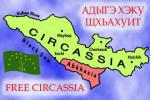Alexander EGOROV | 22.04.2011

The current impression is that the so-called Circassian problem is outgrowing the confines of Russia’s domestic politics and those of other countries hosting considerable Circassian diasporas. Given the strained relations between the West and the Muslim world, it seems likely that the former will attempt to use Russia’s Caucasus as the region where a kind of a compensation can be offered to the latter.
When a well-known Israeli commentator voiced the prediction of an imminent end to “Russia’s two centuries-long colonial rule in the North Caucasus” (sic!), it became clear that the theme would become a permanent part of the agenda. Paul Gobble a figure known to belong to the US intelligence community, was among the first to take over as the champion of the theme. Describing a recent convention of the Joint Baltic-American National committee synchronized with the organization’s 50th anniversary and the 20th anniversary of the Baltic republics’ newly gained independence, Great Britain’ Economist, an influential media outlet, stressed that the event was attended by exotic guests – the representatives of the Circassian diaspora.
The visibility of the Circassian diaspora in the US has been increasing steadily since 2007, largely due to the efforts made by the World Adyg Brotherhood. A new group – the Adyghe Khasa of California – came into being as a part of the process. The Circassian Educational Foundation was established with the help of the Brotherhood based on the Adyghe Khasa of New Jersey, the mission being to attract young Circassians via the Internet to various volunteering activities.
The Jamestown Foundation offered its own version of the recent Circassian history. In 1994, B. Eltsyn said the Caucasian resistance to the Russian tzar’s army in the XIX century was justifiable, but The Jamestown Foundation still criticizes him for stopping short of recognizing the responsibility of the tzar’s regime for genocide. Roughly at the same time, a group of activists from Cabardino-Balkaria and Adygea requested official apologies for the Russian Empire’s campaign from the Russian parliament. In October, 2006, Circassian groups from Russia, Turkey, Israel, Jordan, and several other countries sent a letter to the European Parliament’s President urging the EU to recognize the Circassian people as a victim of genocide. Preparations for the Sochi Olympiad triggered a new round of media campaigning around the Circassian issue.
Speaking at a conference on the alleged Circassian problem a year ago, Iyad Youghar, president of the New Jersey-based Circassian Cultural Institute, laid out three key objectives of the Circassian movement’s radical faction. They are to create an independent Circassian republic (on the territory of the Russian Federation!), to exact recognition of genocide against Circassians from Russia, and to have the Sochi Olympiad abolished. The Circassian diaspora in Israel is roughly as radicalized as that in the US, while the bids to draw Turkey’s Circassians into the orbit seem to meet with no success. As a general rule, there is correlation between the extent of radicalism among Circassian communities – in what concerns the alleged genocide and the Sochi Olympiad – and the inclination of the countries hosting them to wrestle with Russia over influence in the North Caucasus.
The drift of the Circassian groups and the Baltic independence veterans towards each other was widely seen as an indication that the West intends to subject the Circassian movement to a facelift aimed at legitimizing its objective – the establishment of a Circassian republic demanding independence form Russia.
As of today, the above may sound like pure fiction, but the growing interest taken by Western thinktanks and NGOs in the North Caucasus’ web of ethnic and religious problems shows that if, for example, Moscow weakens its grip on the situation in the region, the Circassian problem will take little time to evolve into Russia’s headache. Russia is already confronted with a propaganda campaign which, absent Moscow’s adequate response, may, as it happened routinely in the late epoch of the former Soviet Union, have dire consequences.
At the moment the genocide claims are upheld in Georgia, meaning that Tbilisi has far-reaching plans for the Caucasus. Now the Black Sea navy is patrolling the Caucasian coastline. The escalation which took place not long ago at the border between Georgia and Abkhazia is likely to reflect a broader plan aimed at maintaining permanent tensions in one of Russia’s regions. By the way, regardless of the impact of modern media technologies, the analogy between the present-day developments and those of the epoch of the XIX century war in the Caucasus should not be overlooked.
http://www.strategic-culture.org/news/2011/04/22/circassian-issue-in-the-spotlight.html
